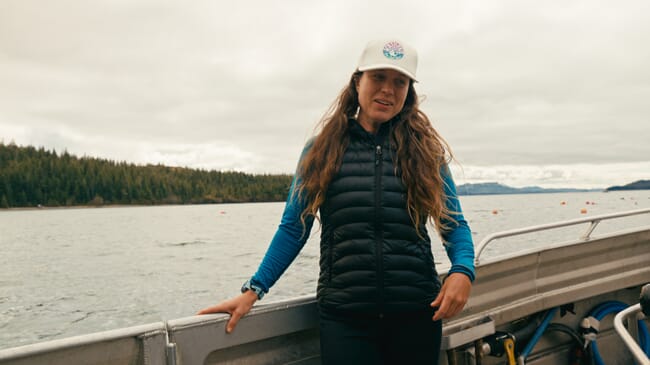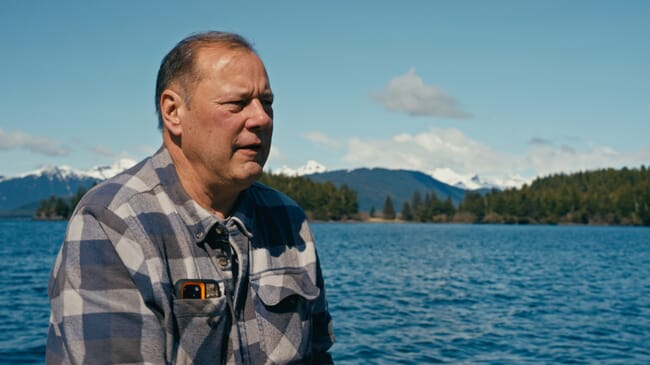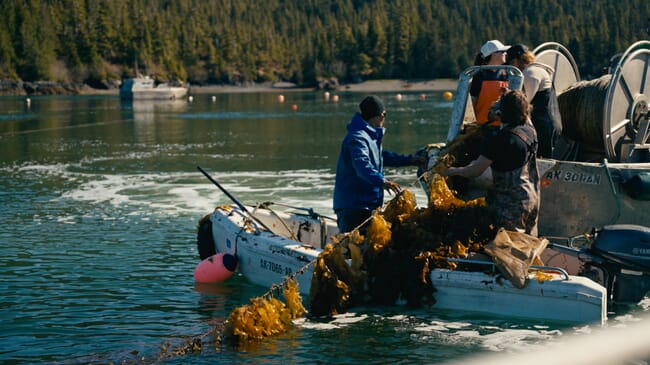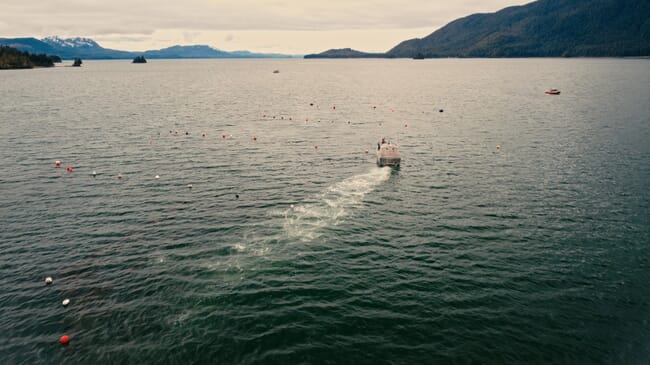
“I was about to leave and go back to college,” reflects Morris, who spent 16 seasons as a fisherwoman. “But I started reading about the properties of kelp and its potential to help with our plastic crisis. And I changed my mind. I put in a lease application in 2021 and we first outplanted in 2023, as the application took almost two years to process.”
That lease spans 22 acres of state waters in Simpson Bay, seven nautical miles outside the town of Cordova, with about four acres currently under cultivation.
The site is made up of a growing network of seed lines, with 17,000 feet of sugar kelp and 3,000 feet of split kelp. But for Morris, kelp farming isn’t just about biomass – it’s about building a movement that can bring economic diversity to a region long tethered to the unpredictable swings of the salmon industry.
“Cordova is incredibly dependent on fishing,” she explains. “And we’ve had some massive fluctuations over the years. Since 2022, Alaska has lost something like a billion dollars annually in fisheries. If there’s a chance to help diversify the economy here, I want to be part of that.”
Blake – a fourth-generation Cordovan, whose family helped build the region’s fishing legacy – shares that vision.
“My grandpa came in 1916 and built a cannery,” he recalls. “I started fishing with my dad when I was six, and I’ve been gillnetting the Copper River for 54 years now.”
Despite his heritage, Blake is realistic about the transition to mariculture.
“The fishery has been changing. Prices are down. Kelp gives us another option – another way to be on the water, doing what we know,” he reflects.
Yet the path to sustainable seaweed farming isn’t easy. Both founders highlight the hefty upfront costs – from gear and seed lines to permitting and transportation.
“We didn’t get any grants,” Blake observes. “It was just Amber and me. We built the farm ourselves. It cost over $30,000 just to get the lines in the water.”

One of the biggest bottlenecks is processing. Without local infrastructure, farmers are forced to dry or ship wet kelp long distances – costs that quickly undermine any potential for profit. And Morris, whose focus is on turning kelp into bioplastics, is adamant that Cordova needs to be more than just a growing site.
“My approach is high-volume, low-cost [production],” she explains. “That only works if we process here in Cordova. Shipping raises prices to the point where we can’t compete. If we want this to be sustainable and scale up, we need a biorefinery.”
Morris has been actively working to bring in a bioplastics biorefinery company to set up a facility in town.
“I’ve already talked to the [fish] processors – Trident, Copper River, Ocean Beauty – and they’re all open to hosting something. But the big hurdle is funding and logistics,” she observes.
Although Morris’s main focus is on bioplastics, she notes that such a refinery could produce components for a wide range of applications, including biostimulants and nutraceuticals – thereby maximising the value of the harvested kelp.
“None of these products uses the whole kelp. So we need multiple outputs to make the economics work. Imagine processing bioplastics from one part of the kelp, and biostimulants from the rest. That’s the future,” she argues.
Seed quality is another persistent challenge.
“In the past, I would have said markets were the biggest issue,” Morris reflects. “But, honestly, seedline quality might be even bigger. Without dependable seed, we can’t grow enough to supply anyone consistently.”

Despite these hurdles, both partners remain deeply committed – not just to kelp, but to Cordova.
“This is the most beautiful place I’ve ever seen,” Morris says. “I’ve been commercial fishing here most of my adult life. I want to give back to the ocean and to the community.”
Blake also sees the next generation as his motivation.
“I want to see young people stay here and make a living. There are kids running around Cordova right now who could be the next generation of sea farmers. They just need a shot.”
“If I can go out, spend a few days setting lines, then a few more harvesting, and make even $50,000 a season, people will take notice. That’s a big deal for young fishermen struggling to make ends meet,” he points out.
However, he is also clear of the need for someone to blaze the trail.
“They won’t get into it until someone proves it works. They need to see success first. And we’re trying to be that success,” he adds.
So, what would it take to reach critical mass?
Blake has three wishes: “Processing equipment. A building to do it in. And some real help – not just for nonprofits, but for individuals like us. Real farmers trying to make it work.”
Meanwhile, Morris is also actively working on product development.
“In five years, I want to be manufacturing two different bioplastic products – one through WildBlue Solutions with my mom, and one with [a third party]. And I want to keep farming. I want to help others get started too.”
While WildBlue Mariculture may be small today, for its founders, it’s just the beginning of something much bigger, at a time when climate change, overfishing and plastic pollution are reshaping the world’s oceans.
*This article is part of a project commissioned by the SEC to highlight the region's mariculture sector. To learn more about the sector visit https://alaska.seaweedinsights...









